In the heart of Tokyo, a timeless tradition endures – the Japanese tea ceremony, or chanoyu. This meticulously choreographed ritual embodies the principles of Zen Buddhism, inviting participants on a mindful journey. By sipping the rich, umami-filled matcha tea and savoring the delicate sweets, guests are transported to a realm of quiet contemplation, where the fleeting beauty of each moment is fully savored. But the true magic lies in the ceremony’s ability to transcend the constraints of time and space, offering a transformative experience that reveals the enduring influence of Zen on Japanese culture.
Key Points
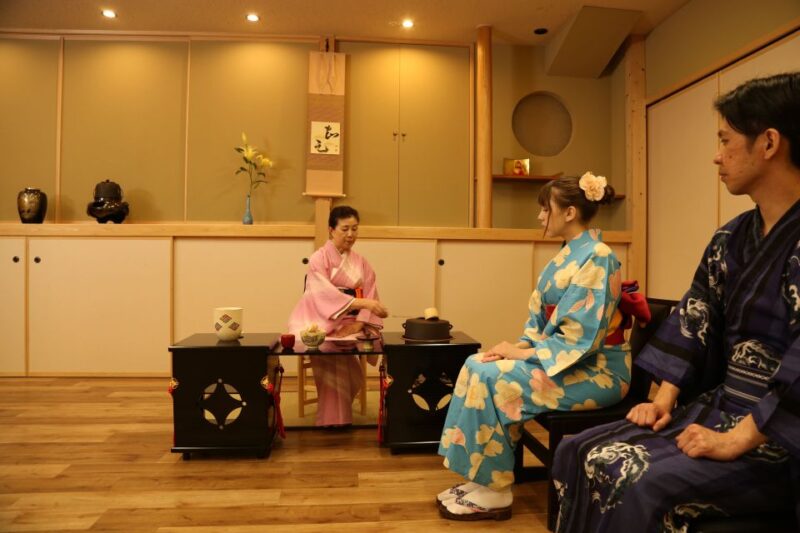
- Immerse in a meticulously choreographed tea ceremony that embodies the principles of Zen Buddhism, including mindfulness, harmony, and respect.
- Savor the rich, vibrant flavor of matcha green tea and traditional Japanese confections while engaging in quiet contemplation.
- Discover how the tea ceremony transcends religious boundaries, offering a transformative experience that cultivates inner peace and appreciation for the present moment.
- Explore the architectural elements of the tea ceremony venue, which create a serene and calming ambiance for the ritual.
- Participate in a hands-on tea ceremony guided by an expert instructor, gaining a deeper appreciation for the intricacies and spiritual significance of this centuries-old Japanese art form.
The Essence of the Tea Ceremony
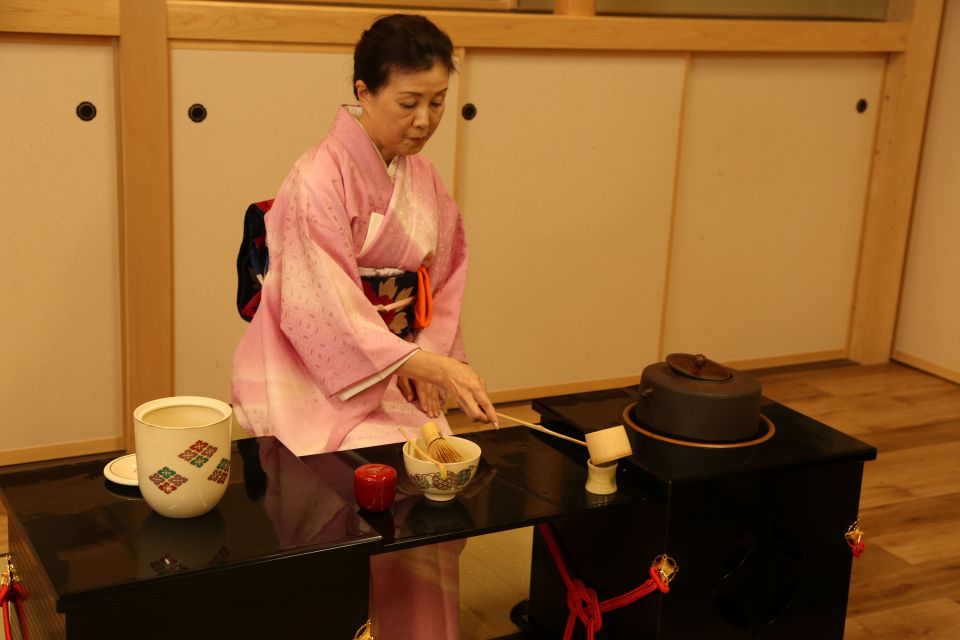
The Japanese tea ceremony, known as chanoyu, is a meticulously choreographed ritual that embodies the essence of Zen Buddhism.
Through a precise series of movements and gestures, practitioners of the tea ceremony cultivate mindfulness, hospitality, and a profound appreciation for the present moment.
The ceremony’s emphasis on simplicity, harmony, and respect reflects the core tenets of Zen.
As the host meticulously prepares and serves the tea, guests engage in quiet contemplation, attuned to the beauty of each action and the fleeting nature of the experience.
You can also read our reviews of more tours and experiences in Tokyo.
Experiencing Matcha Green Tea
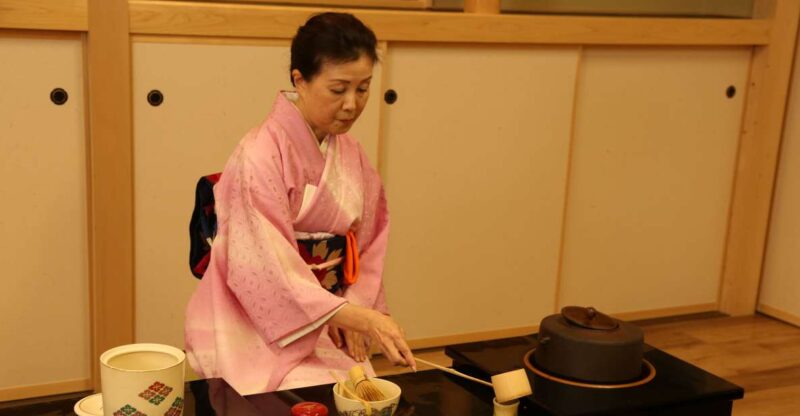
Participants in the Japanese tea ceremony savor the rich, vibrant flavor of matcha green tea, a powdered tea that’s carefully whisked into a frothy beverage. The matcha is served alongside traditional Japanese sweets, creating a harmonious pairing that delights the senses and encapsulates the essence of the tea ritual.
The deep green hue of the matcha reflects the natural beauty of the tea leaves, while its unique umami taste adds depth and complexity to the experience.
As participants sip the tea, they’re invited to slow down, focus on the present moment, and appreciate the intricate details that make the tea ceremony so captivating. This immersive experience offers a glimpse into the world of Zen Buddhism and Japanese aesthetics.
Zen Buddhism and Its Influence
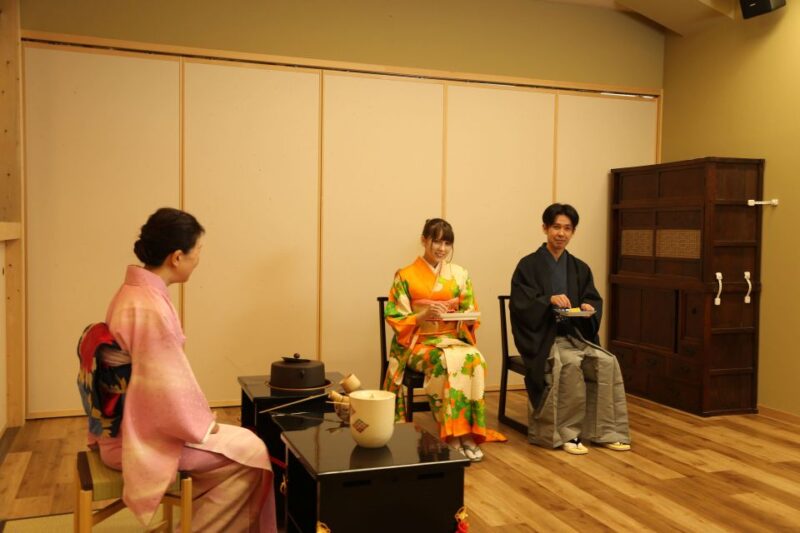
Though deeply rooted in the philosophy of Zen Buddhism, the Japanese tea ceremony transcends religious boundaries, offering practitioners a transformative experience that connects them to the essence of Japanese culture and aesthetics. Zen principles such as mindfulness, simplicity, and harmony are manifested through the carefully choreographed movements, the selection of utensils, and the overall ambiance of the tea ceremony. This ancient practice serves as a vehicle for cultivating inner peace, cultivating a deep appreciation for the present moment, and fostering a harmonious relationship between the host and guest. As participants enjoy the ritual, they are invited to transcend the distractions of the outside world and enter a state of profound stillness and reflection.
| Zen Principles | Tea Ceremony Embodiment |
|---|---|
| Mindfulness | Precise, intentional movements |
| Simplicity | Minimalist aesthetic of utensils |
| Harmony | Graceful interactions between host and guest |
| Interconnectedness | Shared experience of tranquility |
Delightful Traditional Japanese Confections
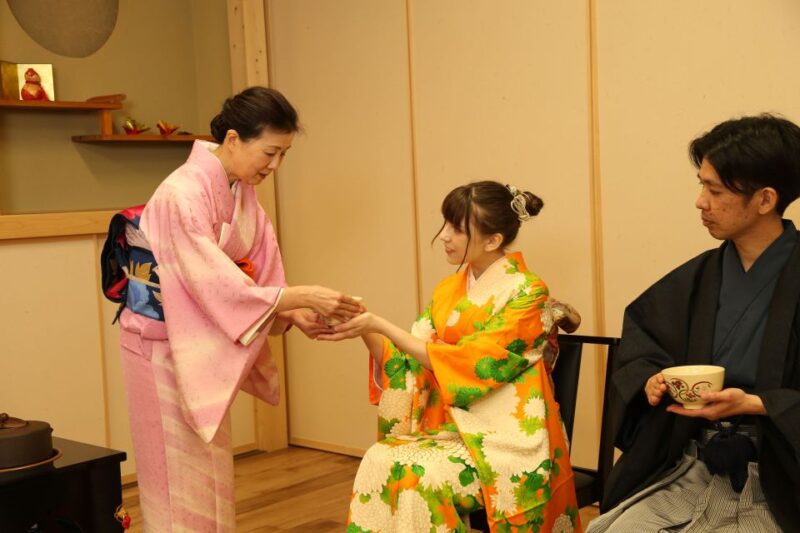
Alongside the soothing green tea, participants delight in savoring traditional Japanese confections, each one a delicate work of edible art. These bite-sized treats, known as wagashi, are meticulously crafted to reflect the changing seasons and the principles of Zen aesthetics.
Some of the highlights include:
-
Mochi – Soft, chewy rice cakes often filled with sweet red bean paste or ice cream.
-
Dango – Skewered dumpling-like sweets made from mochiko (rice flour) and flavored with ingredients like soybean flour or kinako (roasted soybean powder).
-
Higashi – Intricate, jewel-like candies made from sugar, starch, and natural colorings.
-
Yokan – Dense, jelly-like blocks of sweet red bean paste, sometimes featuring intricate designs.
These confections not only delight the palate but also serve as a tangible expression of the harmony and beauty inherent in the Japanese tea ceremony.
More Great Thing To Do NearbyArchitectural Elements of the Venue
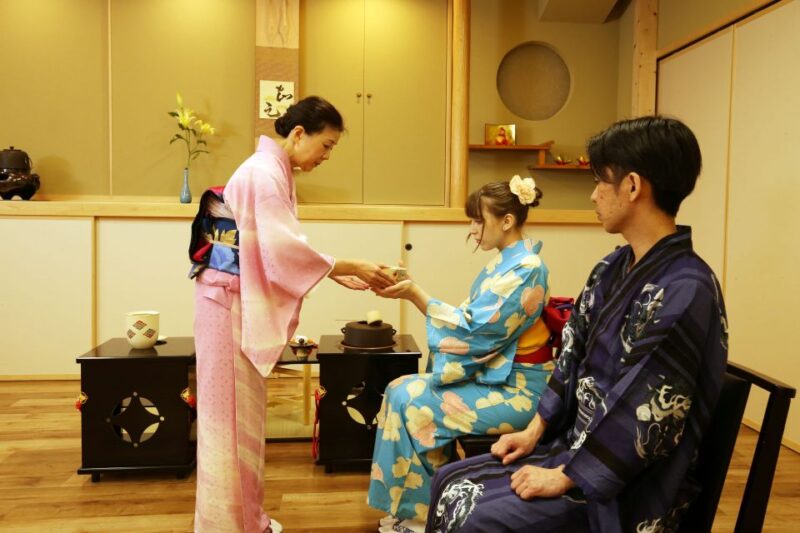
Stepping into the venue, one is immediately struck by the seamless integration of Zen principles into the architectural design. The serene, minimalist aesthetic exemplifies the fundamental tenets of Zen Buddhism, creating a space that is conducive to introspection and the tea ceremony experience.
| Design Element | Significance |
|---|---|
| Tatami mats | Evoke a sense of tradition and tranquility |
| Shoji screens | Allow natural light to filter in, creating a calming ambiance |
| Tokonoma alcove | Showcases a seasonal display, highlighting the connection to nature |
| Engawa veranda | Blurs the boundary between indoor and outdoor spaces, promoting harmony |
The attention to detail and the careful curation of these architectural elements work together to cultivate an atmosphere of serenity, inviting participants to fully enjoy the art of the Japanese tea ceremony.
- Kanto 10-Hour Chartered Day Trip | Tokyo City
- Akihabara Culinary and Culture Adventure: Your Personalized
- Tokyo DisneySea: 1-Day Ticket & Private Transfer
- 1 Day Tokyo Private Charter Sightseeing Tour With Guide
- From Tokyo: Private Day Trip to Nikko
- From Tokyo: Mt. Fuji And Hakone Private Sightseeing Day Trip
Participant-led Tea Ceremony Recreation
After the informative introduction to the Zen principles embodied in the venue’s architecture, participants now have the chance to recreate the tea ceremony themselves under the guidance of the expert instructor.
The instructor walks the group through the precise movements and ritual steps, ensuring everyone understands the significance of each action. Participants then take turns performing the ceremony, carefully following the instructor’s lead.
This hands-on experience allows guests to:
- Develop a deeper appreciation for the intricacies of the tea ceremony.
- Feel the sense of focus and mindfulness required to execute the ritual properly.
- Connect with the Zen philosophy that underpins this traditional Japanese art form.
- Bring home a newfound respect for the centuries-old tea ceremony tradition.
Learning the Ceremonial Movements
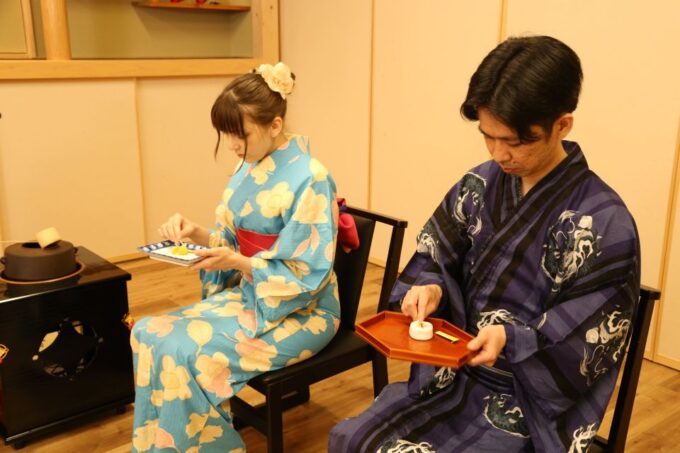
The instructor now guides participants through the precise movements and ritual steps of the tea ceremony, ensuring everyone understands the significance of each action. Participants watch closely as the instructor demonstrates the proper techniques, from the formal entrance to the graceful handling of the tea utensils.
Every movement, from scooping the tea powder to whisking the water, is performed with intentional focus and reverence. Participants are captivated by the fluid elegance and meditative rhythm of the ceremony.
As they carefully follow along, they begin to appreciate the deep connection between the physical actions and the spiritual principles of Zen Buddhism that underpin the tea ritual. With each step, they feel themselves settling into a calmer, more centered state of mind.
Accessible and Inclusive Experience
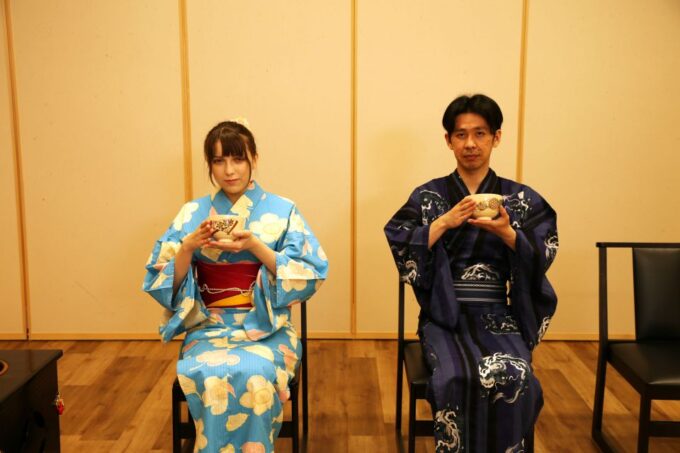
This tea ceremony is designed to be an accessible and inclusive experience for all participants. The small group size, limited to 10 people, ensures an intimate and personalized setting.
On top of that, the venue is wheelchair accessible, enabling individuals with mobility challenges to fully engage in the traditional practice.
The inclusion of this tea ceremony in the overall experience offers several key benefits:
- Participants can enjoy the art of the Japanese tea ceremony without facing barriers to access.
- The intimate group setting promotes a deeper understanding and appreciation of the Zen principles behind the ritual.
- Individuals from diverse backgrounds can come together to collectively explore this traditional cultural practice.
- The accessibility of the venue demonstrates a commitment to creating an equitable and welcoming environment.
Frequently Asked Questions
What Is the Dress Code for the Tea Ceremony?
The dress code for the tea ceremony is typically casual and comfortable. Participants are advised to wear loose, lightweight clothing that allows them to sit comfortably on the floor during the ceremony.
Is Photography Allowed During the Event?
Photography is generally allowed during the tea ceremony, but participants are asked to be respectful and not disrupt the tranquil atmosphere. Attendees should check with the event organizers for any specific guidelines regarding photography.
Can I Bring My Own Tea Set to Use?
Participants are not allowed to bring their own tea set to use during the event. The tea ceremony is conducted with the host’s traditional equipment to ensure an authentic experience. Visitors are expected to use the provided materials.
Is There an Option to Extend the Duration of the Experience?
Yes, there may be an option to extend the duration of the tea ceremony experience. Participants should inquire with the organizers about the possibility of extending the 75-minute standard duration for an additional fee.
Are There Any Age Restrictions for Participants?
The experience has no age restrictions, welcoming participants of all ages. Children are welcome to join, making it a fun and educational activity for the whole family.
Recap
The Japanese tea ceremony is a profound, meditative experience that allows participants to enjoy the principles of Zen Buddhism.
From the preparation of the matcha tea to the delicate movements of the host, every element of the ceremony cultivates a sense of harmony and mindfulness.
By engaging in this centuries-old tradition, guests can deepen their understanding of Japanese culture and find solace in the beauty of the present moment.
You can check if your dates are available here:More Tour Reviews in Tokyo
- Tokyo: Shinobi Samurai Premium EXP for Solo Travelers, 90min
- Mt Fuji Private Tour With English Speaking Driver
- Nerikiri Wagashi-Making With Tea Ceremony Review
- Tokyo 3-Hour Guided E-bike Cycling Tour of the Citys Hidden Gems
- Official Street Go-Kart Tour – Shinagawa Shop
- 【Open 1st Anniv.】Popular Sushi Making Class Near Tokyo Tower
Not for you? Here's more things to do in Tokyo we have recnetly reviewed
- 2 Best Craft Beer Tours And Tastings In Tokyo
- 20 Best 2 Day Tours In Tokyo
- 7 Best 3 Day Tours In Tokyo
- 6 Best 4 Day Tours In Tokyo
- 25 Best Cruises And Boat Tours In Tokyo
- 25 Best Food Tours In Tokyo
- 20 Best Full-Day Tours In Tokyo
- 15 Best Helicopter Flights And Tours In Tokyo
- 2 Best BBQ Experiences In Tokyo
- 5 Best Coffee Tours And Tastings In Tokyo
- 25 Best Lunch Experiences In Tokyo
- 12 Best Massage And Relaxation Services In Tokyo
